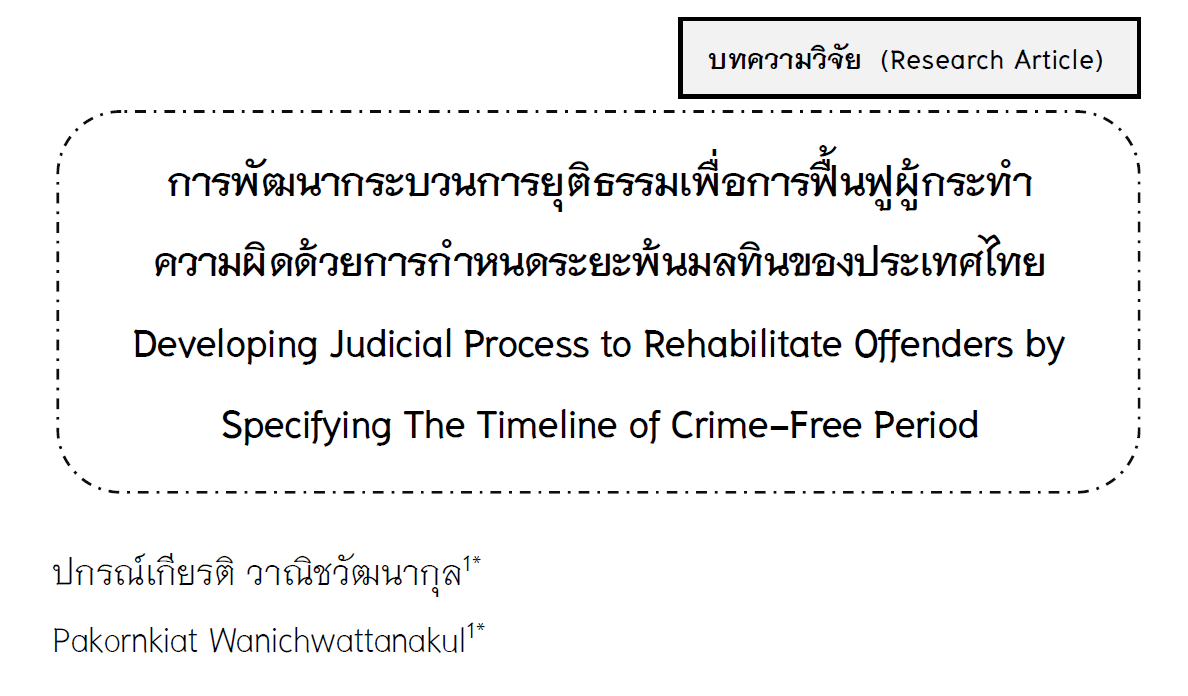Developing Judicial Process to Rehabilitate Offenders by Specifying The Timeline of Crime-Free Period
Keywords:
Crime-free period, Criminal record, Judicial processAbstract
The study recommends that implementing such crime-free period in Thailand requires developing judicial process that maintains a substantial public interest and while ensuring a sense of fairness. This balanced approach, which is appropriate for crime-free period in Thailand, would facilitate the successful reintegration of ex-offenders into society, solve problems caused by having a criminal record and to mitigate the disproportionate effects of a criminal record that hinder rehabilitation. It affects those who deserve a chance to start a new life after, despite completing their punishment, cannot fully overcome society’s negative attitudes, unfair discrimination and the lifelong stigma resulted from their criminal background. This objectives of this study are to help the public and society understand in such manner having a crime-free period for the rehabilitation of ex-offenders after their punishment is fully completed. This involves developing principles related to criminal record in connection with a social values,
as presented through the Collective Conscience. The concept of “Restorative Choice Theory in Justice Administration Law” is also discussed. This concept emphasizes providing ex-offenders with opportunities and choices in life, enabling them to make appropriate life decision and live a normal life. It also aims to create a balance in the judicial process that recognizes the intrinsic value of each human being.
References
เศรษฐา ทวีสิน (ปาฐกถาพิเศษ). (2567). เวทีสาธารณะด้านหลักนิติธรรม (The Rule of Law Forum). วันที่ 5 มกราคม 2567. กรุงเทพฯ: สถาบันเพื่อการยุติธรรมแห่งประเทศไทย (TIJ).
ณรงค์ ใจหาญ. (2543). กฎหมายอาญาว่าด้วยโทษและวิธีการเพื่อความปลอดภัย. สำนักพิมพ์วิญญูชน. กรุงเทพฯ: วิญญูชน.
กองกฎหมายกระบวนการยุติธรรม สำนักงานคณะกรรมการกฤษฎีกา. (2566). หลักเกณฑ์ในการกำหนดโทษทางอาญา. สืบค้น 18 มีนาคม 2566, จาก http://web.krisdika.go.th/data/outsitedata/article77/filenew/10.1.pdf.
วีระ โลจายะ. (2546). เอกสารการสอนชุดวิชากฎหมายมหาชน (พิมพ์ครั้งที่ 3). สำนักพิมพ์ มหาวิทยาลัยสุโขทัยธรรมาธิราช หน่วยที่ 15–18.
แวคส์ เรย์มอนด์. (2564). ปรัชญากฎหมาย (พิมพ์ครั้งที่ 2). กรุงเทพฯ: สำนักพิมพ์บุ๊คสเคป, 167–168.
ศิรสา พูลสนอง. (2543). การล้างมลทินในประเทศไทย. (วิทยานิพนธ์มหาบัณฑิต นิติศาสตรมหาบัณทิต). กรุงเทพฯ: มหาวิทยาลัยธรรมศาสตร์, 25–27.
สถาบันเพื่อการยุติธรรมแห่งประเทศไทย: TIJ. (2563). ผู้หญิงในคุก ชีวิตคนหรือสูตรสมการ. สืบค้น 20 เมษายน 2566, จาก https://knowledge.tijthailand.org/th/article/detail/17.
สุพิชฌาย์ ศิริวัฒนา สีตะสิทธิ์. (2558). แนวทางที่เหมาะสมในการลงโทษและแก้ไขฟื้นฟูผู้กระทำความผิดซ้ำในกระบวนการยุติธรรมไทย. (นิติศาสตร์ดุษฎีบัณฑิต คณะนิติศาสตร์). กรุงเทพฯ: สถาบันบัณทิตพัฒนบริหารศาสตร์, 145–146.
C.L. Ten. (1978). Crime, Guilt and Punishment. Oxford: Basil Blackwell, 217–218.
Herbert L Packer. (1979). The Limits of the Criminal Sanction California. Stanford University Press, 36 – 39.
Latessa, Edward J. Listwan, Shelley L. and Koetzle Deborah. (2015). What Works (and doesn’t) in Reducing Recidivism. Kindle ed. London: Routledge.
Prison Fellowship International. (2008). Restorative Justice briefing paper, Washington. DC: Center for justice&Reconciliation.
Draft Statutory Instruments. (2013). The Rehabilitation of Offender Act 1974 (Exceptions) Order 1975 (Amendment) (England and Wales) Order 2013.
The Statutes of the Republic of Singapore Registration of Criminals ACT 1949.
The Rehabilitation of Offenders Ordinance Act. (1986). This Ordinance may be cited as the Rehabilitation of Offenders Ordinance. Retrieved Order 2012, Form https://www.elegislation.gov.hk/hk/cap297.
World Justice Project org. (2023). Ranking: Countries Scored by Overall Score. Retrieved October 30, 2023, Form https://worldjusticeproject.org/rule-of-law-index/global/2023.

Downloads
Published
How to Cite
Issue
Section
License
Copyright (c) 2024 Phayao University

This work is licensed under a Creative Commons Attribution-NonCommercial-NoDerivatives 4.0 International License.
ผู้นิพนธ์ต้องรับผิดชอบข้อความในบทนิพนธ์ของตน มหาวิทยาลัยพะเยาไม่จำเป็นต้องเห็นด้วยกับบทความที่ตีพิมพ์เสมอไป ผู้สนใจสามารถคัดลอก และนำไปใช้ได้ แต่จะต้องขออนุมัติเจ้าของ และได้รับการอนุมัติเป็นลายลักษณ์อักษรก่อน พร้อมกับมีการอ้างอิงและกล่าวคำขอบคุณให้ถูกต้องด้วย
The authors are themselves responsible for their contents. Signed articles may not always reflect the opinion of University of Phayao. The articles can be reproduced and reprinted, provided that permission is given by the authors and acknowledgement must be given.







